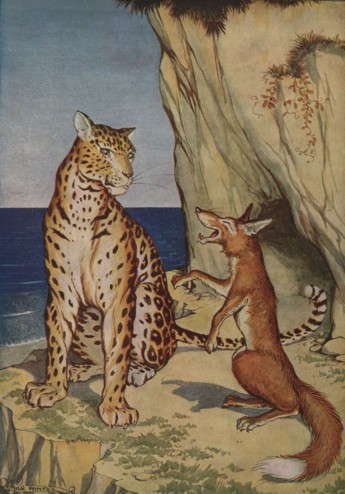Thanks to the great tool at
NoDictionaries.com, I'm creating word lists for the fables in the Aesop's Fables in Latin book. A few words are not included in the word lists and I've noted those below. :-)
See a previous post for
Fables 1-30.
Barlow 31: DE VULPE ET AQUILA. The word list does not recognize absumptura as a future active participle from absumo, abumsere: "consume, waste, lay waste"
Barlow 32: DE COLUMBIS ET ACCIPITRE.
Barlow 33: DE SENE ET MORTE.
Barlow 34: DE CERVO IN BOVIUM STABULO. The word list shows the archaic spelling for the word cervos, when the usual spelling is cervus. It also does not recognize the Late Latin form bovium; the classical form is boum, genitive plural of bos, "ox, cow." The word list also does not recognize the perfect form applausit from the verb applaudo, applaudere, "clap, applaud."
Barlow 35: DE RUSTICO ET COLUBRO. The word list does not recognize the gerund sibilando from the verb sibilo, sibilare, "hiss, whisper."
Barlow 36: DE EQUO ET ASELLO ONUSTO. The word list does not recognize coriarius, "tanner, leather-worker."
Barlow 37: DE LEONE ET MURE. The word list does not recognize the perfect participle abrosus, from the verb abrodo, abrodere, "chew through, gnaw off."
Barlow 38: DE GALLO GALLINACEO. The word list does not recognize the verb disiicio, disiicere, "scatter, break up." It also does not recognize the adjective fulgurans, "flashing, sparkling" and the noun gemmarius, "jeweler."
Barlow 39: DE AQUILA ET TESTUDINE. The definition "three" does not show up for the word tres. The word list does not recognize the adjectives tardigradus, "slow-paced, limping" and indefatigabilis, "untiring." It also does not recognize the perfect form arrepsit from the verb arrepo, arrepere, "creep up to, crawl towards."
Barlow 40: DE ASINO LEONIS PELLE INDUTO. The word list doesn't recognize the iterative verb territo, territare, "to scare, frighten (repeatedly)." It also doesn't recognize the supine noun rugitus, "roar."
Barlow 41: DE URSO ET ALVEARI. The word list does not recognize the diminutive apicula, "bee." It also did not recognize the imperfect form involabat, from the verb involo, involare, "fly at, attack."
Barlow 42: DE IUVENE ET HIRUNDINE. The word list does not recognize the verbs circumvolo, circumvolare, "fly around" and circumvago, circumvagari, "wander around." It also did not recognize the syncopated form enecasse = enecavisse, from the verb eneco, enecare, "kill, deprive of life."
Barlow 43: DE FORMICA ET COLUMBA. The word list did not recognize the diminutive form ramusculus, from ramus, "branch." It also did not recognize the future active participle tensurus from tendo, tendere, "stretch out, extend" and the gerund fricandi from frico, fricare, "scratching." For tibiale it only gives the definition "stocking," when the meaning you need here is the shin itself.
Barlow 44: DE MURE ET RANA. The word list did not recognize the Late Latin noun insultus (classical insultura), "leaping on, attack."
Barlow 45: DE LEONE SENE. The word list does not recognize the word deprivatus, "deprived, robbed of." It also did not recognize the superlative vilissimus, from vilis, "worthless, trashy."
Barlow 46: DE LEONE ET VULPE.
Barlow 47: DE VULPE, CANE ET GALLO. The word list does not recognize the Greek word oden, accusative of the feminine noun ode, "song, ode." It also did not recognize the verb expergiscor, expergisci, "wake, awaken." For utramque, it does not identify the word uterque, "both, each of two."
Barlow 48: DE LEONE ET URSO. The word list does not recognize hinnulus, "fawn." For utrosque, it does not identify the word uterque, "both, each of two."
Barlow 49: DE ALAUDA ET PULLIS EIUS.
Barlow 50: DE PISCATORE ET PISCICULO. The word list does not recognize forms of pisciculus, "little fish." It also does not know the noun smaris, smaridis, "picarel" (a type of fish, very small in size), the adjective futilis, "worthless, fruitless," and the comparative adverb luculentius, from luculenter, "brilliantly, splendidly." It also does not recognize the imperfect subjunctives adhiberem, from adhibeo, adhibere, "apply, put, use" and commutarem from commuto, commutare, "change, exchange."
Barlow 51: DE VULPE SINE CAUDA. The word list did not recognize the adverb indignabunde, "indignantly."
Barlow 52: DE TUBICINE CAPTIVO. The word list did not recognize adjective supplicabundus, "supplicating, pleading" and the verb concito, concitare, "stir up, excite."
Barlow 53: DE LUPO ET AGNO. The word list did not recognize the adjective sitibundus, "thirsting, thirsty."
Barlow 54: DE EQUO ET LEONE. The word list did not recognize the adjective spinosus, "thorny, full of thorns."
Barlow 55: DE CANE ET UMBRA. The word list did not recognize the adjective vorabundus, "greedy, voracious" and the verbs elatro, elatrare, "to burst out barking, howl" desipio, desipere, "act foolishly, be crazy."
Barlow 56: DE ANU ET ANSERE. The word list didn't recognize the superlative avarissimus from avarus, "greedy." It also did not recognize the compound form sublacto from the verb lacto, lactare, "allure, flatter, dupe."
Barlow 57: DE LEPORE ET TESTUDINE.
Barlow 58: DE QUERCU ET ARUNDINE. The word list did not recognize the comparative adjective validior, from validus, "strong, powerful" and the noun Notus, "south wind."
Barlow 59: DE HIRUNDINE ET ALIIS AVICULIS. The word list does not recognize the diminutive avicula, from avis, "bird." It also did not recognize the verb cohabito, cohabitare, "live together, live with."
Barlow 60: DE LEONE, ASINO ET GALLO.



















